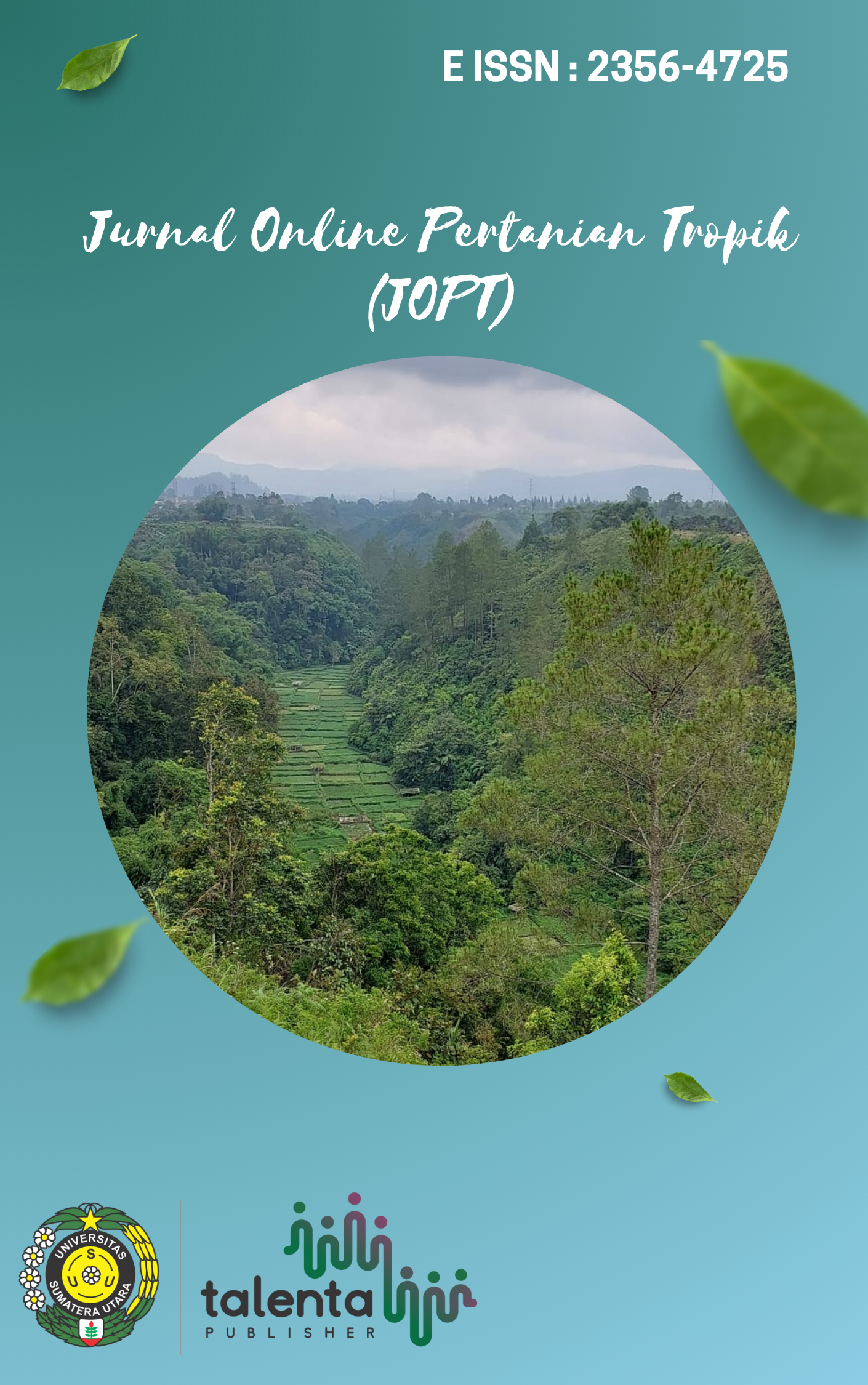The response of oil palm seedlings' growth to vermicompost and water stress under the main nursery stage
DOI:
https://doi.org/10.32734/jopt.v9i3.9933Keywords:
main nursery, water stress, organic matter, oil palm seedlingAbstract
The availability of nutrients and water are two things that are essential for the development of plants. Future oil palm agriculture will require a strategy for the management of water because of the erratic nature of the weather. The addition of organic matter, such as vermicompost, is one strategy for addressing the issue of insufficient water supplies. The primary objective of this study is to investigate the relationship between oil palm seedlings' exposure to vermicompost and various levels of water stress in the main nursery. During the three-month study, 100, 200, and 300 g of vermicompost per polybag was combined with 1.0, 1.5, and 2.0 L/polybag/day. There was no relationship between the dose of vermicompost and the water stress that had observed. The addition of 300 g/polybag of vermicompost increased root fresh weight by 37.8% compared to 100 g/polybag. Moreover, water stress leads to a reduction in plant height and dry weight of the shoots. Compared to 2 L/polybag/day, plant height was lowered by 23.3% and 19.8% at watering volumes of 1.0 and 1.5 L/polybag/day, respectively. In addition, when compared to the appropriate water level of 2 L/polybag/day, high water stress (1.0 L/polybag/day) declined shoot dry weight by 12%.
Downloads
References
Abdi, P., Hanafiah, A. S., & Hanum, H. (2018). Response on Growth of Oil Palm Seedling (Main Nursery) by Adding Several Amandement, Fertilizer and Sulphate Reduction Bacteria on Acid Sulphate Soils. Jurnal Pertanian Tropik , 5(3), 344–354. https://doi.org/10.32734/JPT.V5I3.3062
Agung, R. (2019). Pengaruh pupuk organik vermikompos terhadap pertumbuhan kelapa sawit (Elaeis guinensis jacq.) di pembibitan utama. Universitas Andalas.
Bulgin, C. E., Merchant, C. J., & Ferreira, D. (2020). Tendencies, variability and persistence of sea surface temperature anomalies. Scientific Reports 2020 10:1, 10(1), 1–13. https://doi.org/10.1038/s41598-020-64785-9
Chen, L., Zhao, Z., Guo, G., Li, J., Wu, W., Zhang, F., & Zhang, X. (2022). Effects of muddy water irrigation with different sediment gradations on nitrogen transformation in agricultural soil of Yellow River Basin. Water Science and Engineering, 15(3), 228–236. https://doi.org/10.1016/J.WSE.2021.12.005
Darmawan, S., Carolita, I., Agustan, Dirgahayu, D., Suyadini, W., Hernawati, R., & Wiratmoko, D. (2021). Model Fenologi Kelapa Sawit Berbasis Pengindraan Jauh (I. Carolita & D. Dirgahayu, Eds.; 1st ed.). ITENAS.
Dewanti, S. K., Fuskhah, E., & Sutarno. (2019). Growth and yield of kale (Brassica oleracea var. Acephala) on different vermicompost dosages and plant spacings. Jurnal Pertanian Tropik , 6(3), 394–402. https://doi.org/10.32734/JPT.V6I3.3178
Domonhédo, H., Cuéllar, T., Espeout, S., Droc, G., Summo, M., Rivallan, R., Cros, D., Nouy, B., Omoré, A., Nodichao, L., Arondel, V., Ahanhanzo, C., & Billotte, N. (2018). Genomic structure, QTL mapping, and molecular markers of lipase genes responsible for palm oil acidity in the oil palm (Elaeis guineensis Jacq.). Tree Genetics & Genomes 2018 14:5, 14(5), 1–12. https://doi.org/10.1007/S11295-018-1284-7
Dubovitski, A. A., Konovalova, M. E., Strelnikova, T. D., Pilipchuk, N. v., & Shvetsova, I. N. (2021). Assessment of the impact of climate risks on agriculture in the context of global warming. IOP Conference Series: Earth and Environmental Science, 845(1), 012145. https://doi.org/10.1088/1755-1315/845/1/012145
Farooq, A., Bukhari, S. A., Akram, N. A., Ashraf, M., Wijaya, L., Alyemeni, M. N., & Ahmad, P. (2020). Exogenously Applied Ascorbic Acid-Mediated Changes in Osmoprotection and Oxidative Defense System Enhanced Water Stress Tolerance in Different Cultivars of Safflower (Carthamus tinctorious L.). Plants, 9(1), 104. https://doi.org/10.3390/PLANTS9010104
Johnson, J. v, Exton, D. A., Jaimie, |, Dick, T. A., Oakley, J., Jompa, J., & Pincheira-Donoso, D. (2022). The relative influence of sea surface temperature anomalies on the benthic composition of an Indo-Pacific and Caribbean coral reef over the last decade. Ecology and Evolution, 12(9). https://doi.org/10.1002/ECE3.9263
Kaur, G., Singh, G., Motavalli, P. P., Nelson, K. A., Orlowski, J. M., & Golden, B. R. (2020). Impacts and management strategies for crop production in waterlogged or flooded soils: A review. Agronomy Journal, 112(3), 1475–1501. https://doi.org/10.1002/AGJ2.20093
Kautsar, V., Tang, S., Kimani, S. M., Tawaraya, K., Wu, J., Toriyama, K., Kobayashi, K., & Cheng, W. (2022). Carbon decomposition and nitrogen mineralization of foxtail and milk vetch incorporated into paddy soils for different durations of organic farming. Soil Science and Plant Nutrition, 68(1), 158–166. https://doi.org/10.1080/00380768.2021.2024424
Khasanah, U. N. (2018). Pengaruh Pemberian Pupuk Kascing Terhadap Pertumbuhan Tanaman Kelapa Sawit (Elaeis guineensis Jacq.) Di Main Nursery. In Ulfa Nur Khasanah. Universitas Andalas.
Lamb, W. F., Wiedmann, T., Pongratz, J., Andrew, R., Crippa, M., Olivier, J. G. J., Wiedenhofer, D., Mattioli, G., Khourdajie, A. al, House, J., Pachauri, S., Figueroa, M., Saheb, Y., Slade, R., Hubacek, K., Sun, L., Ribeiro, S. K., Khennas, S., de La Rue Du Can, S., … Minx, J. (2021). A review of trends and drivers of greenhouse gas emissions by sector from 1990 to 2018. Environmental Research Letters, 16(7), 073005. https://doi.org/10.1088/1748-9326/ABEE4E
Liliane, T. N., & Charles, M. S. (2020). Factors Affecting Yield of Crops. In Agronomy: Climate Change. Intechopen.
Mahlia, T. M. I., Ismail, N., Hossain, N., Silitonga, A. S., & Shamsuddin, A. H. (2019). Palm oil and its wastes as bioenergy sources: a comprehensive review. Environmental Science and Pollution Research 2019 26:15, 26(15), 14849–14866. https://doi.org/10.1007/S11356-019-04563-X
Masani, M. Y. A., Izawati, A. M. D., Rasid, O. A., & Parveez, G. K. A. (2018). Biotechnology of oil palm: Current status of oil palm genetic transformation. Biocatalysis and Agricultural Biotechnology, 15, 335–347. https://doi.org/10.1016/J.BCAB.2018.07.008
Meijaard, E., Brooks, T. M., Carlson, K. M., Slade, E. M., Garcia-Ulloa, J., Gaveau, D. L. A., Lee, J. S. H., Santika, T., Juffe-Bignoli, D., Struebig, M. J., Wich, S. A., Ancrenaz, M., Koh, L. P., Zamira, N., Abrams, J. F., Prins, H. H. T., Sendashonga, C. N., Murdiyarso, D., Furumo, P. R., … Sheil, D. (2020). The environmental impacts of palm oil in context. Nature Plants 2020 6:12, 6(12), 1418–1426. https://doi.org/10.1038/s41477-020-00813-w
Minasny, B., & McBratney, A. B. (2018). Limited effect of organic matter on soil available water capacity. European Journal of Soil Science, 69(1), 39–47. https://doi.org/10.1111/EJSS.12475
Mishra, P., & Dash, D. (2022). Contributing effects of vermicompost on soil health and farmers’ socioeconomic sustainability. Trends of Applied Microbiology for Sustainable Economy, 737–757. https://doi.org/10.1016/B978-0-323-91595-3.00005-7
Naz, H., Akram, N. A., & Ashraf, M. (2016). Impact of ascorbic acid on growth and some physiological attributes of cucumber (cucumis sativus) plants under water-deficit conditions. Pakistan Journal of Botany, 48(3), 877–883. http://inis.iaea.org/Search/search.aspx?orig_q=RN:47116071
Nugraha Ramadhani, T., & Priyo Santoso, R. (2019). Competitiveness analyses of Indonesian and Malaysian palm oil exports. Economic Journal of Emerging Markets, 11(1), 46–58. https://doi.org/10.20885/EJEM.VOL11.ISS1.ART5
Olle, M. (2019). Review : vermicompost, its importance and benefit in agriculture. Agraarteadus, 30(2), 93–98. https://doi.org/10.15159/JAS.19.19
Purba, J. H. V. (2019). Replanting policy of Indonesian palm oil plantation in strengthening the implementation of sustainable development goals. Iopscience.Iop.Org, 336, 12012. https://doi.org/10.1088/1755-1315/336/1/012012
Safitri, L., Hermantoro, H., Purboseno, S., Kautsar, V., Saptomo, S. K., & Kurniawan, A. (2018). Water Footprint and Crop Water Usage of Oil Palm (Eleasis guineensis) in Central Kalimantan: Environmental Sustainability Indicators for Different Crop Age and Soil Conditions. Water 2019, Vol. 11, Page 35, 11(1), 35. https://doi.org/10.3390/W11010035
Safitri, L., Kautsar, V., Purboseno, S., Wulandari, R. K., & Ardiyanto, A. (2018). Water Footprint Analysis of Oil Palm. International Journal of Oil Palm, 1(3), 95–102. http://www.ijop.id/index.php/ijop/article/view/14
Sebayang, W. N. U., Sabrina, T., Rahmawati, N., & Lubis, N. (2022). The analysis of decomposition rate of Vermigot fertilizer (vermicompost and kasgot) by utilizing of Black Soldier Fly larvae and earthworms with and without technique feeding. Jurnal Pertanian Tropik, 8(3), 156–162. https://doi.org/10.32734/jpt.v8i3
Silalahi, J. E. L., Charloq, & Fery. (2021). The Effect of Watering Frequency on Several Types of Oil Palm (Elais guineensis Jacq.) Great Bunches Superior Seeds “Yangambi†in Main Nursery Ages of 4 to 7 Months. Jurnal Online Agroekoteknologi, 9(1), 11–18. https://doi.org/10.32734/jaet.v9i1.6530
Singh, A., Karmegam, N., Singh, G. S., Bhadauria, T., Chang, S. W., Awasthi, M. K., Sudhakar, S., Arunachalam, K. D., Biruntha, M., & Ravindran, B. (2020). Earthworms and vermicompost: an eco-friendly approach for repaying nature’s debt. Environmental Geochemistry and Health 2020 42:6, 42(6), 1617–1642. https://doi.org/10.1007/S10653-019-00510-4
Wang, L., Lee, M., Ye, B., & Yue, G. H. (2020). Genes, pathways and networks responding to drought stress in oil palm roots. Scientific Reports 2020 10:1, 10(1), 1–13. https://doi.org/10.1038/s41598-020-78297-z
Yetik, A. K., & Candoğan, B. N. (2022). Chlorophyll Response to Water Stress and the Potential of Using Crop Water Stress Index in Sugar Beet Farming. Sugar Tech, 1, 1–12. https://doi.org/10.1007/S12355-022-01184-6/FIGURES/9
Yue, G. H., Ye, B. Q., & Lee, M. (2021). Molecular approaches for improving oil palm for oil. Molecular Breeding 2021 41:3, 41(3), 1–17. https://doi.org/10.1007/S11032-021-01218-Z
Zahan, K. A., & Kano, M. (2018). Biodiesel production from palm oil, its by-products, and mill effluent: A review. Energies, 11(8), 2132. https://doi.org/10.3390/en11082132
Zhang, X., Hao, Z., Singh, V. P., Zhang, Y., Feng, S., Xu, Y., & Hao, F. (2022). Drought propagation under global warming: Characteristics, approaches, processes, and controlling factors. Science of The Total Environment, 838, 156021. https://doi.org/10.1016/J.SCITOTENV.2022.156021
Downloads
Published
How to Cite
Issue
Section
License
Copyright (c) 2022 Jurnal Pertanian Tropik

This work is licensed under a Creative Commons Attribution-ShareAlike 4.0 International License.






















